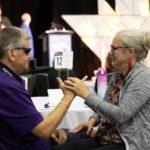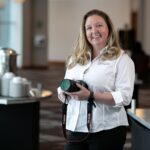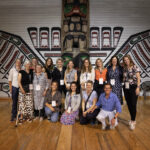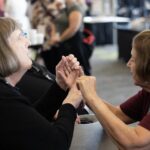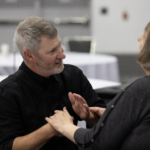
Adrian smiles for the camera at The Ex in downtown Toronto.
When Canadian Helen Keller Centre (CHKC) opened its doors in 1992 its goal was to provide affordable and accessible housing for Canadians who are deafblind.
But with only 16-units available it was impossible to serve all of the 400,000 Canadians who have dual sensory loss; individuals who are both legally deaf and legally blind.
Since those first days CHKC has grown exponentially to provide additional programs and services to the 16 tenants who live at 422 Willowdale Ave. as well as the 18 outreach consumers who live in the province of Ontario.
In addition to housing, consumers at CHKC have access to Intervenor Services daily. The number of hours varies and is based on individual needs. This allows consumers to access their communities more independently.
But housing continues to be a focus of CHKC’s mission and vision, as it looks towards a brighter future where people who are deafblind can live just as securely as those who are more able-bodied.
In 2022 CHKC secured Federal funding through the Rapid Housing Initiative to build a state-of-the-art 56-unit housing complex in the Lakeshore-Etobicoke neighborhood of Toronto located at 150 Eighth Street. The goal is to provide even more affordable and accessible housing to the deaflblind population.
To people like Adrian Cosentino who, as a person who is deafblind since birth, has struggled with finding affordable housing his whole life.
“Through Intervenor Services Adrian is able to live as independently as possible,” says Lessette Morales, Consumer Support Specialist at CHKC. “But the lack of affordable and accessible housing for people who are deafblind means that Adrian is vulnerable to homelessness. That’s why we’re here, to support him through the intricacies of Toronto housing. There is still more work for us to do and we are committed to succeeding for Canadians who are deafblind.”
Providing an opportunity for individuals like Adrian did not previously exist, but this new initiative has opened many doors for those who live with dual sensory loss and who can benefit from affordable and accessible accommodations.
“I’m looking forward to applying to live at 150 Eighth Street,” says Adrian. It’s something that I’ve been waiting a long time for.”
To apply to live at CHKC, visit our website at chkc.org and click the ‘Housing’ tab located on the top menu bar.
Lessette continues, “With additional housing we can ensure that people like Adrian can live more independently and safely. People who are deafblind are vulnerable members of our community
and providing our consumers with adequate housing is one of our top priorities. This new funding will allow us to meet more people’s needs and that is something Ontarians should be proud of.”
Individuals who are deafblind, like Adrian, deserve the right to live independently, and CHKC is dedicated more than ever to making that possible.
To apply to live at CHKC, visit our website at chkc.org and click the ‘Housing’ tab located on the top menu bar.
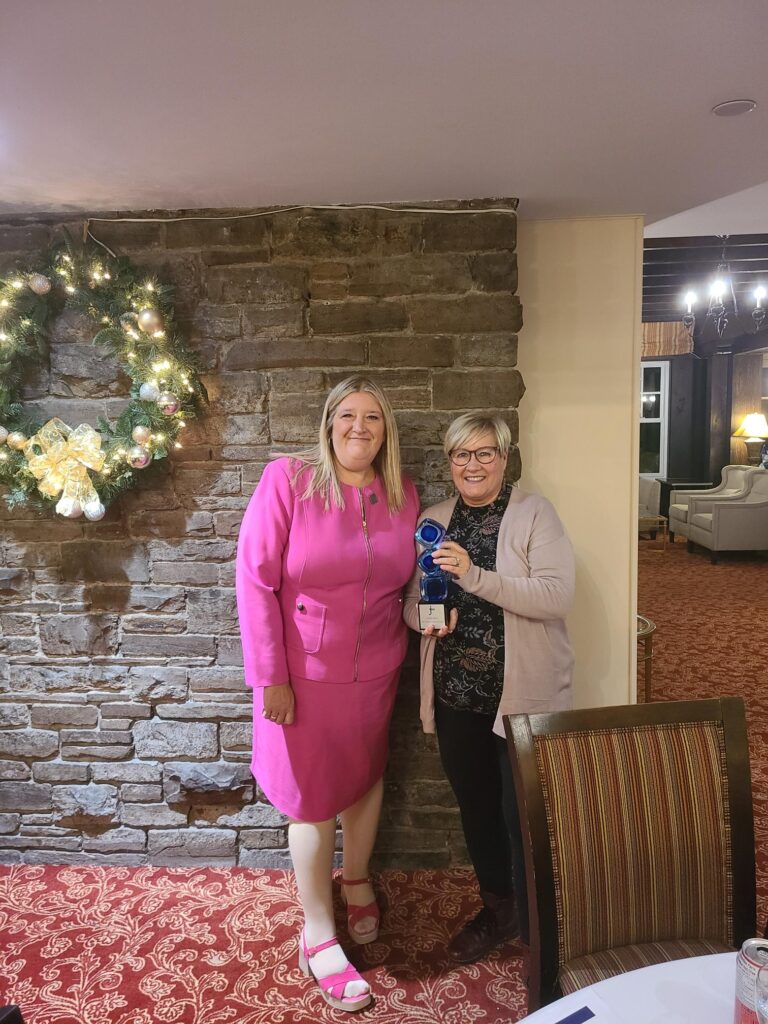
Cathy Proll, the recipient of the 13th Annual JT Award and CEO of Sensity, stands with her award next to Jennifer Robbins, Executive Director, CHKC.
On Tuesday, November 14, at CHKC’s Annual General Meeting (AGM), Cathy Proll was awarded the 13th Annual JT Award.
The “JT Award” recognizes significant contributions to the Canadian deafblind community by a deserving individual, consumer group or service provider who has demonstrated excellence in the categories of awareness to the disability of deafblindness, expansion to available services and programs and involvement of individuals who are deafblind at all levels.
Below are the remarks from Jennifer Robbins, Executive Director, CHKC, about Cathy’s service to the deafblind community.
Congratulations Cathy!
Sensity CEO, Cathy Proll demonstrates true leadership in the field of deafblindness in Ontario, Canada and internationally. Her excellence in bringing awareness to the disability of deafblindness has been instrumental in the expansion to available services and programs.
Cathy Proll began working with children who were congenitally deafblind in the provincial school in Ontario, first in the school setting and later as a resource consultant supporting children and families across the province of Ontario.
Cathy left the education sector and began her work with adults that were transitioning from the school setting to adult services. Through her work with the Canadian Deafblind and Rubella Association Ontario Chapter, Cathy was a practitioner and an advisor in the development and provision of Intervenor services and service agencies in Ontario.
Cathy led the development of the resource centre in 2012 allowing for the expansion of services to serve deafblind individuals. The centre located in Paris, Ontario is the first of its kind, features a multi-purpose room complete with a kitchen, a sensory or “Snoezelen” room, a two-bedroom respite area, four accessible bathrooms, a music room, copy room and much more.
In every role, Cathy demonstrates unwavering determination and commitment for people who are deafblind. With the resource centre established, it was time for a new project. In 2016, the apartment complex adjacent to the resource centre was developed. The complex is now home to 20 residents, with four three-bedroom units, two two-bedroom units and two one-bedroom units. It also includes an upstairs guest apartment where families are welcome to stay. The apartments were designed in collaboration with Vicano Construction Ltd. to ensure it was completely accessible with features to make getting around easier for individuals. Tiles, fixtures, and paint colours were all chosen to provide a high level of contrast for those who have some limited vision. There are also varied textures on titles and other surfaces to help them navigate.
Also included in the ground development is a spacious sensory garden that includes plants specially selected for their scent and colours, a water feature, a musical bench, and gazebo.
Cathy has distinguished herself the field of deafbindness internationally. As a board member for Deafblind International (DbI) for the past 12 years. In addition, Sensity is the current Secretariat for DbI. She also is Chairs the Deafblind Coalition of Ontario which was established in 2013 as a formal group to identify and address the needs of the sector in Ontario. Cathy acts as the current Chair.
In closing, Cathy continues to leave behind an indelible legacy in the field of deafblindness and is a worthy nominee for the JT Award.
- Two people communicate using hand over hand ASL. A man is on the left of the picture and a woman is on the right. They are both sitting.
- Sarah Bradley stands with her camera smiling at the camera.
- A group of people on stage smiling for the camera on opening night of the conference.
- Two consumers communicate using hand-over-hand ASL.
- An intervenor and consumer communicate using hand-over-hand ASL.
This week I had the pleasure and the honour of shooting the Deafblind International World Conference in Ottawa, Canada. I have photographed many large conferences, but this one really touched me.
When shooting events my goal is to capture the overall event including guests in posed, candid & engaging shots in a photo-journalistic manner. Telling the story of the event through my photos.
My first interaction with the delegates was at a social evening. I did my usual thing: posed group shots; candid shots of people laughing and enjoying themselves; photographing speakers as well as the entertainment. It didn’t take me long to realize this was going to be a different conference.
Over the next few days, I witnessed the incredible bond between individuals with deafblindness
(interesting to note that MS Word underlines this as a spelling mistake!) and their translators (which I now know are called intervenors). I was absolutely mesmerized. I watched 2 people with deafblindness engaged in a conversation together using tactile signing (something I have never heard of – google it!). There was another very inspiring lady with deafblindness in a wheelchair who had one intervenor tactile signing while another touched her back in various ways to communicate what was happening in the room; whether it be laughter or applause.
My photography style quickly changed to include capturing that bond by focussing on the hands.
By day 5 I felt like a part of this very tight, loving, supportive community. In fact, I was very emotional knowing it was coming to an end. I have a newfound awareness of the deaf, the blind, but especially the deafblind.
With much love;
Sarah the photographer who is 5’3 with dark blonde hair and green eyes.
Special shoutout to Bettyanne Sherrer from CanPlan Event & Conference Services for introducing me to this inspiring community.
How to find Sarah:
Facebook: ishootevents.ca
Instagram: @ishootevents.ca
Twitter: @i_shoot_events
LinkedIn: iShootEvents
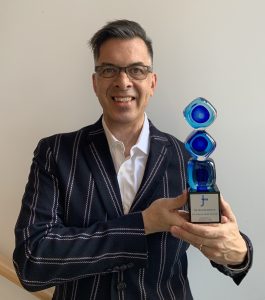 The “JT Award” recognizes significant contributions to the Canadian deafblind community by a deserving individual, consumer group or service provider who has demonstrated excellence in at least one of the categories of:
The “JT Award” recognizes significant contributions to the Canadian deafblind community by a deserving individual, consumer group or service provider who has demonstrated excellence in at least one of the categories of:
- Awareness to the disability of deafblindness,
- Expansion to available services and programs,
- Involvement of individuals who are deafblind at all levels.
Joyce Thompson was awarded the JuneFest Award of Excellence in 2010. Thereafter, in her honour, the award was re-named the JT Award. Past winners were:
2011 – Jane Sayer
2012 – Elio Riggillo
2013 – Eddy Morton
2014 – Joan Mactavish
2015 – Roxanna Spruyt-Rocks
2016 – Cindy Accardi
2017 – Megan McHugh
2018 – Warren Wakefield
2019 – Stan Monroe
2020 – Walter Wittich
2021 – Bonnie Heath
2022 – Penny Bennett
Past nominees not chosen for the award can be re-nominated.
To nominate another individual or group please contact us and include:
- the category of the nomination,
- how the nominee demonstrates the spirit of the award, and
- Include two letters of support.
The award recipient will be officially recognized in September at CHKC’s AGM, but does not need to be present to win/accept the award.
Please submit nominations by Monday, August 28, 2023 to:
JT Award Selection Committee
c/o Canadian Helen Keller Centre
101-422 Willowdale Avenue
Toronto, ON M2N 5B1
Phone (647) 518-9048
fcignelli@chkc.org
- Rendering of the new building at 150 Eighth Street.
- Rendering of the new building at 150 Eighth Street.
- Rendering of the new building at 150 Eighth Street.
- Rendering of the new building at 150 Eighth Street.
- Rendering of the new building at 150 Eighth Street.
The Canadian Foundation for Physically Disabled Persons (CFPDP) and Canadian Helen Keller Centre (CHKC) have a proud, shared history. Both organizations were founded several decades ago by The Honourable Vim Kochhar with help from other passionate individuals who wanted to make a difference.
Today, CHKC is a remarkable success story. It provides accessible housing, programming and intervenor services for people who are deafblind. This helps alleviate the severe isolation that people with deafblindness can experience without specialized services, adaptive communication methods and appropriate housing.
“CHKC is unique because we have a 16-unit affordable housing building where deafblind consumers live independently in their own apartments,” says Jennifer Robbins, Executive Director of CHKC. “For over 30 years, these residents have received support from intervenors, who become the eyes and ears of people with vision and hearing loss. We also offer intervenor support to deafblind consumers living in the community.”
Over 400,000 Canadians are deafblind, each with individual needs that require special attention. Intervenors exist for communication and to create independence. They help consumers take part in the same types of day-to-day activities that any individual may choose to participate in. This can include dining at a restaurant, attending an exercise class, going to a doctor’s appointment or grocery shopping. Additionally, intervenors help deafblind people to socialize and create closer relationships with family and friends.
More Housing, More Independence
CHKC is currently embarking on its most ambitious project to date. Under the leadership of CHKC Board Chair Philip Corke and CHKC Director Anupam Kothari, the organization is building a 56-unit affordable and accessible apartment building. The new housing development will help reduce CHKC’s waitlist and give more people with a combination of hearing and vision loss access to an independent life. People with other disabilities will use any remaining units.
“Being independent is important for a person’s mental health and overall well-being,” says Robbins. “It also helps people who are deafblind to be fully immersed within the community and society at large.”
CHKC’s new apartment complex will also have a 6,500 sq. ft. state-of-the-art training centre where deafblind people can learn essential life skills to aid in their independence. This includes communication systems such as American Sign Language (ASL) and tactile ASL to braille and print-on-palm. There will be training in home management skills such as cleaning, laundry, and home safety, organization and maintenance. Consumers can learn about cooking, safe food handling/storage, personal grooming (e.g., shaving, putting on make-up), money management (e.g., budgeting, online banking) and technology (e.g., general computer skills, Apple and Android devices, deafblind-friendly apps). As well, CHKC offers social programs that evolve around sharing meals, gardening and other peer group activities.
“Accessibility is an important part of creating inclusive and welcoming communities,” says Robbins. “As an experienced housing provider for Canadians who are deafblind, we know what is needed to create independence and community under the same roof. Our entire team, which includes members of the deafblind community and independent committee members, is working passionately to help more people with dual sensory loss access an independent life. We are incredibly proud of the work that has been accomplished. CHKC is also eternally grateful for the financial support to fund our growth and help make this new apartment building a reality.”
So far, CHKC has secured $32 million of the $38 million needed to complete the project. The organization’s goal is to raise the remaining $6 million from generous donors and sponsors.
“A portion of the funds raised at CFPDP’s very first Great Valentine Gala helped build CHKC’s 16-unit independent-living apartment building in Toronto’s Willowdale neighbourhood,” says Hon. Kochhar. “Over the decades, we have continued to organize hugely successful events to provide ongoing support to CHKC and people with physical disabilities. We are proud of this legacy and encourage those who can give to do so generously.”
Please contact info@chkc.org for information regarding available sponsorship opportunities. Or visit our microsite at 150eighthstreet.ca or our Ways To Give page on the CHKC website.
Article written by Christine Payne
It’s December already! Below you will find a list of activities for the month of December 2022. Have a lovely holiday season.
Thursday, December 1
BINGO (Hybrid) 1:00 p.m. to 3:00 p.m.
Friday, December 2
CHKC Chat Club (In-person) 1:00 p.m. to 3:00 p.m.
Monday, December 5
Current Events Club (Hybrid) 1:00 p.m. to 3:00 p.m.
Tuesday, December 6
Seniors Drop In (Hybrid) 1:00 p.m. to 3:00 p.m.
Thursday, December 8
Breakfast Club (RSVP Only) 9:00 a.m. to 11:00 a.m.
Saturday, December 10
Paint Club (Hybrid) 12:30 p.m. to 3:30 p.m.
Monday, December 12
DeafBlind Peer Support Group 1:00 p.m. to 3:00 p.m.; 7:00 p.m. to 9:00 p.m.
Tuesday, December 13
Chili Drop In (In-person) 4:00 p.m. to 7:00 p.m.
Wednesday, December 14
Games Club (In-person) 1:00 p.m. to 3:00 p.m.
Thursday, December 15
BINGO (Hybrid) 1:00 p.m. to 3:00 p.m.
Friday, December 16
iOS Club (Hybrid) 12:30 p.m. to 3:30 p.m.
Saturday, December 17
Holiday Baking (RSVP Only) 10:30 a.m. to 1:30 p.m.; 2:00 p.m. to 5:00 p.m.
Monday, December 19
Current Events Club (Hybrid) 1;00 p.m. to 3:00 p.m.
Tuesday, December 20
Seniors Drop In (Hybrid) 1:00 p.m. to 3:00 p.m.
Thursday, December 22
Breakfast Club (RSVP Only) 9:00 a.m. to 11:00 a.m.




